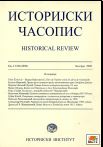Никола Бокшић (на странпутици пословне каријере)
Nikola Bokšić (Sidestepping out of his career)
Author(s): Author Not SpecifiedSubject(s): History
Published by: Istorijski institut, Beograd
Keywords: Bokšići; Nikola; Žore; Maruša; Dubrovnik; district of Luka; Olovo; protovestijar; customs officer; lead; salt; debts
Summary/Abstract: The absence of Nicola's will disables researchers to discover numerous details of his private and family life. It was only during the mid- 1390's that we observe a pale figure of a man who has just turned 18, and who did not undertake the property his father had bequeathed to him, inspite of the fact that he was the only male successor in the family. His mother Maruša was still the administrator of his father's property, in the role of executor of his late husband Žora's will. Upon leaving his hometown and moving to Bosnia, Nikola was firstly employed as a protovestijar at king Ostoja's court and as a custom renter of Drijevi. He later completely dedicated himself to accomplishment of his private affairs in the districts of Luka and Olovo. Main segment of Nikola's affairs of the time represented the Bosnian lead he dealt in, by means of merchandise credits, and trade with the prominent Bosnian lords. As a consequence, he found himself frequently severely indebted. If we add to this his frequent and tiring trips from Luka, at the mouth of Neretva, to Visoki, via Boreč and Olovo, as well as his evident unresourcefulness, we get the clear picture of Nikola's bankruptcy and failure. Analogous to the modest results Nikola achieved in his affairs and public life, he was neither the luckiest man in his private and family life. Supported only by his mother Maruša, being "procuratrixa ... eius fily", he met his life's end, as it seems, in the household together with "Mrs Klara, widow of Nikola the protovestijar", of whom shall be spoken afterwards. We know that she accepted to go "to her family and her homeland, not to Dubrovnik", upon her husband's death, which corresponds to the decree of the Statute of Dubrovnik, that obliged childless widows to leave their late husband's house in a month's time, as well as to restitute their property to their relatives.
Journal: Историјски часопис
- Issue Year: 2010
- Issue No: 59
- Page Range: 155-176
- Page Count: 22
- Language: Serbian

